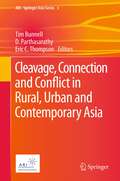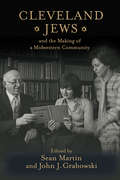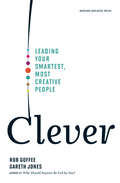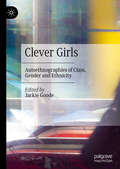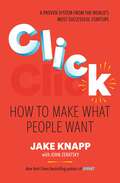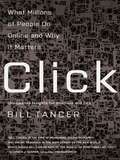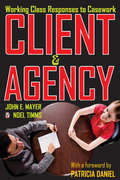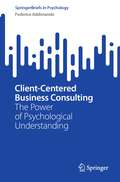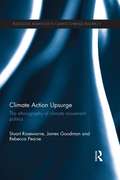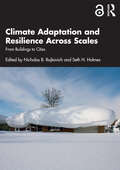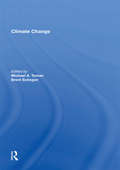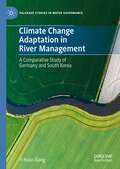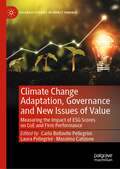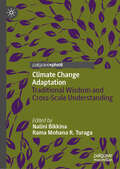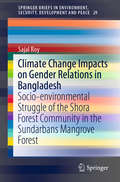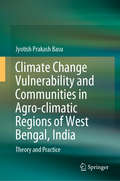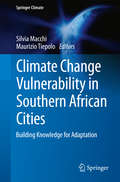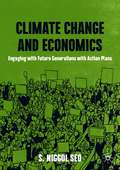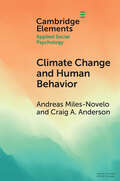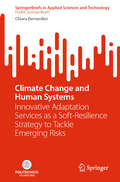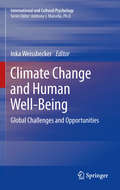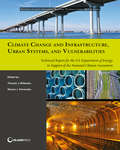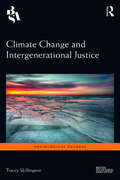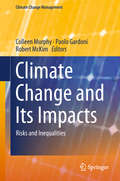- Table View
- List View
Cleavage, Connection and Conflict in Rural, Urban and Contemporary Asia (ARI - Springer Asia Series #3)
by Eric C. Thompson D Parthasarathy Tim BunnellAsia, the location of the world's fastest-growing economies, is also home to some of the fastest rates of urbanization humanity has ever seen, a process whose speed renders long-term outcomes highly unpredictable. This volume contrasts with much published work on the rural/urban divide, which has tended to focus on single case studies. It provides empirical perspectives from four Asian countries: India, Indonesia, Malaysia, and Thailand, and includes a wealth of insights that both critique and expand popular notions of the rural-urban divide. The volume is relevant not just to Asian contexts but to social scientific research on population dynamics more generally. Rather than deploying a single study to chart national trends, three chapters on each country make possible much more complex perspectives. As a result, this volume does more than extend our understanding of the interplay between cities and hinterlands within Asia. It enhances our notions of rural/urban cleavages, connections and conflicts more generally, with data and analysis ready for application to other contexts. Of interest to diverse scholars across the social sciences and Asian studies, this work includes accounts ranging from rural youth real estate entrepreneurs in Hyderabad, India, to social development in Aceh province in Indonesia, devastated by the 2004 tsunami, to the relationship between urban space and commonly held notions of the supernatural in Thailand's northern city of Chiang Mai.
Cleveland Jews and the Making of a Midwestern Community
by Ira Robinson Shaul Kelner Eli Lederhendler Samantha Baskind Sylvia F. Abrams Rachel Gordan Todd Michney Zohar Segev Mary McCune Mark SoutherThis volume gathers an array of voices to tell the stories of Cleveland’s twentieth century Jewish community. Strong and stable after an often turbulent century, the Jews of Cleveland had both deep ties in the region and an evolving and dynamic commitment to Jewish life. The authors present the views and actions of community leaders and everyday Jews who embodied that commitment in their religious participation, educational efforts, philanthropic endeavors, and in their simple desire to live next to each other in the city’s eastern suburbs. The twentieth century saw the move of Cleveland’s Jews out of the center of the city, a move that only served to increase the density of Jewish life. The essays collected here draw heavily on local archival materials and present the area’s Jewish past within the context of American and American Jewish studies.
Clever
by Gareth Jones Rob GoffeeIf your company is like most, it has a handful of people who generate disproportionate quantities of value: A researcher creates products that bankroll the entire organization for decades. A manager spots consumer-spending patterns no one else sees and defines new market categories your enterprise can serve. A strategist anticipates global changes and correctly interprets their business implications.Companies' competitiveness, even survival, increasingly hinge on such "clever people." But the truth is, clever people are as fiercely independent as they are clever-they don't want to be led. So how do you corral these players in your organization and inspire them to achieve their highest potential?In Clever, Rob Goffee and Gareth Jones offer potent insights drawn from their extensive research. The authors explain how to:-Identify your clever people and their motivations-Shelter your "clevers" from political distractions that can inhibit their productivity-Help clevers generate even more value by creating clever teams-Manage the unique tensions that can arise when clevers work togetherLeading clever people can be enormously challenging, yet doing so effectively is the key to your organization's sustained success. Lively and engaging, this book provides the ideas, practices, and examples you need to create an environment where your most brilliant people can flourish.
Clever Girls: Autoethnographies of Class, Gender and Ethnicity
by Jackie GoodeThis collection by three generations of women from predominantly working-class backgrounds explores the production of the classed, gendered and racialized subject with powerful, engaging, funny and moving stories of transitions through family relationships, education, friendships and work. The developments that take place across a life in processes of ‘becoming’ are examined through the fifteen autoethnographies that form the core of the book, set within an elaboration of the social, educational and geo-political developments that constitute the backdrop to contributors’ lives. Clever Girls discusses the status of personal experience as ‘research data’ and the memory work that goes into the making of autoethnography-as-poiesis. The collection illustrates the huge potential of autoethnography as research method, mode of inquiry and creative practice to illuminate the specificities and commonalities of experiences of growing up as ‘clever girls’ and to sound a ‘call to action’ against inequality and discrimination.
Click: How to Make What People Want
by Jake KnappFrom the New York Times bestselling authors of Sprint, a guide for starting big projects the smart way—based on firsthand experience with more than three hundred new products and businesses.Every big project—whether it&’s creating new technology, developing a fresh line of sneakers, or opening a neighborhood café—requires a major investment to get off the ground. Unfortunately, most big projects flop with customers. Too many teams waste time, money, and opportunity because they follow the wrong strategy and lose sight of what really matters: Do people want what you&’re making? Does your solution click with customers? Jake Knapp and John Zeratsky—two brilliant product designers who spent years at Google Ventures and elsewhere before founding a venture capital firm together—have helped hundreds of teams bring new products and services into the world. As designers and investors, they have a front-row seat to some of the world&’s most successful startups. Click introduces the Foundation Sprint—a proven system for starting projects the right way, to make better decisions and move quickly toward a solution. Inside are ten important lessons, a step-by-step playbook for the Foundation Sprint, and memorable stories from Nike, Google, Slack, and the frontiers of artificial intelligence research. Building on their bestselling book, Sprint, Knapp and Zeratsky introduce new recipes that teams can use to quickly and confidently start projects. For anyone who has ever had a good idea but didn&’t know how to start, this book is for you.
Click: What Millions of People Are Doing Online and Why It Matters
by Bill TancerWhat time of year do teenage girls search for prom dresses online? How does the quick adoption of technology affect business success (and how is that related to corn farmers in Iowa)? How do time and money affect the gender of visitors to online dating sites? And how is the Internet itself affecting the way we experience the world? In Click, Bill Tancer takes us behind the scenes into the massive database of online intelligence to reveal the naked truth about how we use the Web, navigate to sites, and search for information--and what all of that says about who we are. As online directories replace the yellow pages, search engines replace traditional research, and news sites replace newsprint, we are in an age in which we've come to rely tremendously on the Internet--leaving behind a trail of information about ourselves as a culture and the direction in which we are headed. With surprising and practical insight, Tancer demonstrates how the Internet is changing the way we absorb information and how understanding that change can be used to our advantage in business and in life. Click analyzes the new generation of consumerism in a way no other book has before, showing how we use the Internet, and how those trends provide a wealth of market research nearly as vast as the Internet itself. Understanding how we change is integral to our success. After all, we are what we click.
Clickology
by Graham JonesOnline shopping continues to grow at an astounding rate: in 2012, more than $1 trillion was spent in online retailers alone. The nature of shopping is drastically changing, but with so little information on how best to interact with online customers, how are businesses to succeed?With Click.ology, internet psychologist Graham Jones has filled that gap. Through years of research into Internet psychology and online consumer habits, Jones has written the first how-to of its kind for online businesses. With his C.L.I.C.K. system, businesses will learn the crucial ways in which online shopping differs from traditional brick-and-mortar salesmanship and how to tweak their websites to avoid the dreaded "abandoned shopping cart." Jones tackles tricky psychological subjects such as priming customers for a certain price point and the social aspect of online shopping in a way that makes his strategies easy to implement. In addition to these essential tips, Jones investigates the fast-paced future of ecommerce and what businesses can do to stay ahead of the game. In an online world where customers make their choices in a matter of seconds, Click.ology distills the essentials every company in the online economy needs to know in order to turn clicks into dollars.Graham Jones is an Internet psychologist who helps businesses understand the online behavior of their customers and website visitors. He was one of the first psychologists in the world to start investigating the way human behavior has adapted to the online world. He lives in the United Kingdom.
Client and Agency: Working Class Responses to Casework
by John MayerIt is a startling and somewhat disturbing fact that social work researchers-as well as research psychiatrists and psychologists-have rarely explored the treatment situation from the standpoint of the client. Client and Agency, first published in the 1960s, explores by means of free-fl owing interviews, a close-up picture of the client's experiences at a social work agency.There has been a growing awareness of the importance of consumer opinion in the social services following the wide spread impact of consumer groups, particularly those concerned with educational and medical services. Social work agencies have hesitated, uncertain about the researchers and their methods, and fearful of the outcome. But it is desirable that they incorporate the views of consumer groups because client opinion is one way of checking the effectiveness of their work.The practice of social work requires the application of knowledge derived from a variety of sources and academic disciplines. It is frequently difficult to relate conflicting evidence and diverse theories about human behavior for use in day-to- day work with acutely troubled and deprived people. It points to the need for more extensive studies of both consumers and suppliers of social work services because it raises many pertinent questions. In Client and Agency clients of a Family Welfare Association discuss the kind of help they expect to receive, their impressions of the social worker and the treatment process, and the ways they felt they were helped or not helped.
Client-Centered Business Consulting: The Power of Psychological Understanding (SpringerBriefs in Psychology)
by Federico AddimandoThis book explores the psychology behind effective business consulting. We dive into the various factors that shape client behavior and decision-making, and we provide insights into the most effective techniques and strategies for building rapport, establishing trust, and delivering value. Whether you are a seasoned consultant looking to refine your skills, or a new consultant seeking to build a solid foundation, this book is designed to provide you with the tools and knowledge you need to succeed in the dynamic and demanding world of business consulting.
Climate Action Upsurge: The Ethnography of Climate Movement Politics (Routledge Advances in Climate Change Research)
by James Goodman Rebecca Pearse Stuart RosewarneIn the late 2000s climate action became a defining feature of the international political agenda. Evidence of global warming and accelerating greenhouse gas emissions created a new sense of urgency and, despite consensus on the need for action, the growing failure of international climate policy engendered new political space for social movements. By 2007 a ‘climate justice’ movement was surfacing and developing a strong critique of existing official climate policies and engaging in new forms of direct action to assert the need for reduced extraction and burning of fossil fuels. Climate Action Upsurge offers an insight into this important period in climate movement politics, drawing on the perspectives of activists who were directly engaged in the mobilisation process. Through the interpretation of these perspectives the book illustrates important lessons for the climate movement today. In developing its examination of the climate action upsurge, the book focuses on individual activists involved in direct action ‘Climate Camps’ in Australia, while drawing comparisons and highlighting links with climate campaigns in other locales. The book should be of interest to scholars and researchers in climate change, environmental sociology, politics, policy and activism.
Climate Adaptation and Resilience Across Scales: From Buildings to Cities
by Nicholas B. RajkovichClimate Adaptation and Resilience Across Scales provides professionals with guidance on adapting the built environment to a changing climate. This edited volume brings together practitioners and researchers to discuss climate-related resilience from the building to the city scale. This book highlights North American cases that deal with issues such as climate projections, public health, adaptive capacity of vulnerable populations, and design interventions for floodplains, making the content applicable to many locations around the world. The contributors in this book discuss topics ranging from how built environment professionals respond to a changing climate, to how the building stock may need to adapt to climate change, to how resilience is currently being addressed in the design, construction, and operations communities. The purpose of this book is to provide a better understanding of climate change impacts, vulnerability, and resilience across scales of the built environment. Architects, urban designers, planners, landscape architects, and engineers will find this a useful resource for adapting buildings and cities to a changing climate.
Climate Change
by Michael A. TomanOver the years, a large and growing literature on the economics of climate change has developed. Within this volume the contributors have included a wide range of journal essays that consider the impact of climate change on specific sectors; goods and services; the costs and benefits of greenhouse gas (GHG) mitigation; and policy design for mitigation, including both domestic instruments and issues related to international agreements.
Climate Change Adaptation in River Management: A Comparative Study of Germany and South Korea (Palgrave Studies in Water Governance: Policy and Practice)
by Yi hyun KangThis book examines the approaches to climate change adaptation in water governance taken by South Korea and Germany. By comparing their political decision-making processes, this book explores the factors behind their differences. Adaptation to the changing climate is critical to human society and water is the principal medium through which climate change will affect us. Due to high levels of industrialization and population density, flood control is a high priority in both countries’ adaptation plans. While South Korea has maintained its engineering-oriented flood control policy for river management, Germany has turned its direction from its long-standing technical approach to more nature-based solutions. The evidence of this study indicates that policy change and stability is the result of discourse and institutional interaction, and thus emphasizes the validity of discursive institutionalism. This book will clearly explain why certain policies are adopted for water management and will be an invaluable contribution to the expanding literature on the socio-political aspects of climate change adaptation.
Climate Change Adaptation, Governance and New Issues of Value: Measuring the Impact of ESG Scores on CoE and Firm Performance (Palgrave Studies in Impact Finance)
by Carlo Bellavite Pellegrini Laura Pellegrini Massimo CatizoneThis book investigates sustainability, CSR, climate change adaptation, the relevance of ESG scores and their impact on firm value and growth. The first part of the book analyses the topics from a conceptual angle. The authors discuss how the concepts of self-consciousness and awareness drive the shift of the traditional concept of corporate mission towards more sustainable business models. The authors propose an in-depth analysis of the main challenges posed by climate change and of the initial policy-makers’ responses and provide their view on the central role of ESG scores and circular economy for growth and development. The authors conclude with an analysis of the main literature on the measurement of the relation between ESG scores and firms’ performance and cost of equity (CoE). The second part of the book contains comparative empirical evidence, supporting these theories across specific industries, and will be of interest to academics, researchers, and students of sustainability and impact finance.
Climate Change Adaptation: Traditional Wisdom and Cross-Scale Understanding
by Nalini Bikkina Rama Mohana R. TuragaThis book discusses how climate change needs to be anchored in indigenous knowledge with reference to resource management, infrastructure, livelihoods, and social institutions, with a unique focus on risks and provenances of resilience available to the local communities. Beyond the scientific know-how on climate change, this volume highlights traditional wisdom, which through its hands-on learning plays a crucial role in amalgamation with cross-scale understanding. It documents the deliberations of a seminar that brought together traditional wisdom and cross-scale understanding of academicians, researchers, practitioners, and grassroots functionaries directly or indirectly working with communities in the area of climate change adaptation and thereby brings together adaptation and allied practices from across a spectrum of specialties and practitioner contexts. It discusses several insights and novel practices and is purported to provide significant research and policy implications in the spirit of thinking globally but acting locally.
Climate Change Impacts on Gender Relations in Bangladesh: Socio-environmental Struggle of the Shora Forest Community in the Sundarbans Mangrove Forest (SpringerBriefs in Environment, Security, Development and Peace #29)
by Sajal RoyThis book explores gendered perceptions of the Sundarbans Forest in Bangladesh, and the extent to which these perceptions are affected by extreme weather events (specifically, cyclones Aila and Sidr). Based on ethnographic fieldwork in Shora, a rural village in southern Satkhira, Bangladesh, the book explores gendered activities in the forest, especially women’s interaction with the forest resources. The findings present a clear picture of the Shora community’s local knowledge about the Sundarbans Forest, as well as the ecological and economic contributions for the forest people. The book makes a timely contribution to the wider study of gender, post-cyclone recovery, ecology and resilience.
Climate Change Vulnerability and Communities in Agro-climatic Regions of West Bengal, India: Theory and Practice
by Jyotish Prakash BasuThis book addresses the quantitative measurement of climate change vulnerability at the macro and micro-level and identifies household adaptation strategies to cope with the adverse effects of climate change. Focusing on five different agro-climatic regions of West Bengal: the hill region, foothill region, drought region, and coastal regions of Sunderban and Purba Midnapore, it presents research related to various sectors, including the agricultural, forestry and informal sectors. The book also offers insights into the impact of climate change on smallholdings, forest-dependent communities, fishing and crab collecting communities, casual labourers and workers in the informal sectors, and identifies the key vulnerabilities associated with climate change, as well as the causes of such vulnerability the extent to which remedial measures have been taken. The book particularly highlights the role of Indian governmental policies like Sarva Shiksa Abhiyan, Mahatma Gandhi National Rural Employment Guarantee Act (MGNREGA), the housing scheme, Indira Awas Yojana, the Food for Work Programme, and the rural road building scheme, Pradhan Mantri Grameen Sadak Yojana, which are important for rural development and in reducing vulnerability. Showcasing vulnerability measurement in the socio-ecological system, the book will appeal to developmental practitioners, government implementation agencies, policymakers and researchers in the field of environmental science and policymakers will find this book appealing.
Climate Change Vulnerability in Southern African Cities: Building Knowledge for Adaptation (Springer Climate)
by Silvia Macchi Maurizio TiepoloIn recent decades, extreme rains and drought have struck urban regions in Africa like never before. Nevertheless, limited information is available on which to base development of early warning systems, identification of high-risk zones and formulation of local action plans. This book is about how to build the knowledge necessary for planning adaptation to climate change in Sub-Saharan cities. It brings together lessons learned from international development actions conducted by a number of scholars in disciplines ranging from meteorology and hydrogeology to urban planning and environmental management. Selected methods to assess the impacts of extreme weather and ecological stress are presented along with possible approaches to improve the adaptive capacity of Sub-Saharan cities through institutional measures at the local government level. The book is addressed to graduate students, researchers and practitioners interested in enhancing their knowledge and skills in order to integrate climate change into applied research and development projects in urban Africa.
Climate Change and Economics: Engaging with Future Generations with Action Plans
by S. Niggol SeoThis textbook provides a broad introduction to the relationship between climate change, economics, and climate policy for young readers and future generations. It highlights the problem of intergenerational gaps and burden sharing on climate change. Taking on major contentious issues of today, it is rich with behavioural strategies and real life experiences which are explained in an accessible and engaging way. A diverse range of topics are covered, including farm animals of Sub-Sahara, Latin American rainforests, Indian monsoon agriculture, tropical cyclones in Bangladesh, sublime grasslands, energy revolutions, hydroelectric dams of China, backstop technologies, ocean exchanges with the atmosphere, mass extinction of species, commercial fisheries, infectious diseases and pandemics, and a climate policy big deal. Climate Change and Economics: Engaging with Future Generations with Action Plans aims to engage with young readers and offer action plans for activists. It is relevant to students interested in environmental economics and environmental science.
Climate Change and Human Behavior: Impacts of a Rapidly Changing Climate on Human Aggression and Violence (Elements in Applied Social Psychology)
by Andreas Miles-Novelo Craig A. AndersonMuch of the current rhetoric surrounding climate change focuses on the physical changes to the environment and the resulting material damage to infrastructure and resources. Although there has been some dialogue about secondary effects (namely mass migration), little effort has been given to understanding how rapid climate change is affecting people on group and individual levels. In this Element, we examine the psychological impacts of climate change, especially focused on how it will lead to increases in aggressive behaviors and violent conflict, and how it will influence other aspects of human behavior. We also look at previously established psychological effects and use them to help explain changes in human behavior resulting from rapid climate change, as well as to propose actions that can be taken to reduce climate change itself and mitigate harmful effects on humans.
Climate Change and Human Systems: Innovative Adaptation Services as a Soft-Resilience Strategy to Tackle Emerging Risks (SpringerBriefs in Applied Sciences and Technology)
by Chiara BernardiniThis book offers a thorough review of studies on climate change and urban adaptation strategies and plans. It takes the moves from the identification of three primary barriers to adaptation, including the uncertainty surrounding climate change and its evolution, the complexity of human systems, and the widespread perception that climate change impacts are improbable. From this analysis arises the idea of the need to adopt a new approach to the climate issue: the soft approach. This approach focuses on the intangible and organizational aspects of systems and is proposed as a valid alternative in contexts of high uncertainty. It complements the structural (hard) option in response to emerging risks. Furthermore, soft solutions have intrinsic characteristics of flexibility, reversibility, adaptability, scalability, and cost-effectiveness, making them often low-regret and co-benefit. Based on these principles, the book suggests that a climate-wise reorganization of urban services couldconstitute an effective soft strategy to help cities tackle the impacts of climate change and investigates the potential for Urban Facility Management services to evolve through their integration with climate information. The concept of urban Adaptation services, which integrate knowledge and practices of climate services into urban services management processes, is an innovative perspective which stems from a reading of reality through the lens of specific needs.
Climate Change and Human Well-Being: Global Challenges and Opportunities (International and Cultural Psychology)
by Inka WeissbeckerClimate change is increasing the severity of disasters and adverse weather conditions worldwide, with particularly devastating effects on developing countries and on individuals with lower resources. Climate change is likely to impact mental health and psychosocial well-being via multiple pathways, leading to new challenges. Direct effects such as gradual environmental changes, higher temperatures, and natural disasters, are likely to lead to more indirect consequences such as social and economic stressors, population displacement, and conflict. Climate change, largely the product of industrialized nations, is projected to magnify existing inequalities and to impact the most vulnerable, including those with low resources, individuals living in developing countries and specific populations such as women, children and those with pre-existing disabilities. This book outlines areas of impact on human well being, consider specific populations, and shed light on mitigating the impact of climate change. Recommendations discuss ways of strengthening community resilience, building on local capacities, responding to humanitarian crises, as well as conducting research and evaluation projects in diverse settings.
Climate Change and Infrastructure, Urban Systems, and Vulnerabilities: Technical Report for the U.S. Department of Energy in Support of the National Climate Assessment (NCA Regional Input Reports)
by Thomas J. Wilbanks Steven FernandezHurricane Irene ruptured a Baltimore sewer main, resulting in 100 million gallons of raw sewage flooding the local watershed. Levee failures during Hurricane Katrina resulted in massive flooding which did not recede for months. With temperatures becoming more extreme, and storms increasing in magnitude, American infrastructure and risk-management policies require close examination in order to decrease the damage wrought by natural disasters. Climate Change and Infrastructure, Urban Systems, and Vulnerabilities addresses these needs by examining how climate change affects urban buildings and communities, and determining which regions are the most vulnerable to environmental disaster. It looks at key elements of urban systems, including transportation, communication, drainage, and energy, in order to better understand the damages caused by climate change and extreme weather. How can urban systems become more resilient? How can citizens protect their cities from damage, and more easily rebound from destructive storms? This report not only breaks new ground as a component of climate change vulnerability and impact assessments but also highlights critical research gaps in the material. Implications of climate change are examined by assessing historical experience as well as simulating future conditions. Developed to inform the 3rd National Climate Assessment, and a landmark study in terms of its breadth and depth of coverage and conducted under the auspices of the U. S. Department of Energy, Climate Change and Infrastructure, Urban Systems, and Vulnerabilities examines the known effects and relationships of climate change variables on American infrastructure and risk-management policies. Its rich science and case studies will enable policymakers, urban planners, and stakeholders to develop a long-term, self-sustained assessment capacity and more effective risk-management strategies.
Climate Change and Intergenerational Justice (Sociological Futures)
by Tracey SkillingtonSynonymous with catastrophe and destructive tendencies, the Anthropocene provokes reflection on the limits of existing applications of ideas of responsibility, ecological agency and democratic justice. Youth campaigners, in particular, make emerging insights on the Anthropocene of central importance to an intersubjectively generated redefinition of the just society of the future. Given their span of affectedness, escalating rates of greenhouse gas emissions shape the ecological circumstances of generations to come and implicate them in harm relations they had no hand in creating. The realization is that human-inspired climate-destructive practices reverberate across plural time frames, thereby raising serious questions about the value of conventional interpretations of the copresence of sources of climate harm and their effects on the health and environmental living standards of all peoples. If injuries provoked by environmental degradation emerge across multiple time frames and affect generations differentially, where do we draw the boundaries of the just society, and how do we identify its most relevant subjects? This book explores how such questions have ignited one of the most important debates on democratic justice in recent years – that between generations. For mobilized youth and future justice coalitions campaigning internationally, expanding resource inequalities (regionally and intergenerationally) are fundamentally issues of unfair exclusions and asymmetries in relations of power between generations. The book offers a comprehensive overview of new insights being generated through such debate on the limitations of democratic presentism, as well as current institutional applications of civil and human rights norms. It assesses overall how the metapolitical relevance of modernity’s democratic project is being creatively redefined in terms more relevant to Anthropocene futures.
Climate Change and Its Impacts: Risks and Inequalities (Climate Change Management)
by Colleen Murphy Paolo Gardoni Robert McKimResponding to a need for a deeper and more nuanced understanding of the consequences of climate change, this book brings experts in climate science, engineering, urban planning, and conservation biology into conversation with scholars in law, geography, anthropology and ethics. It provides insights into how climate change is conceptualized in different fields. The book also aims to contribute to developing successful and multifaceted strategies that promote global, intergenerational and environmental justice. Among the topics addressed are the effects of climate change on the likelihood and magnitude of natural hazards, an assessment of civil infrastructure vulnerabilities, resilience assessment for coastal communities, an ethical framework to evaluate behavior that contributes to climate change, as well as policies and cultural shifts that might help humanity to respond adequately to climate change.
